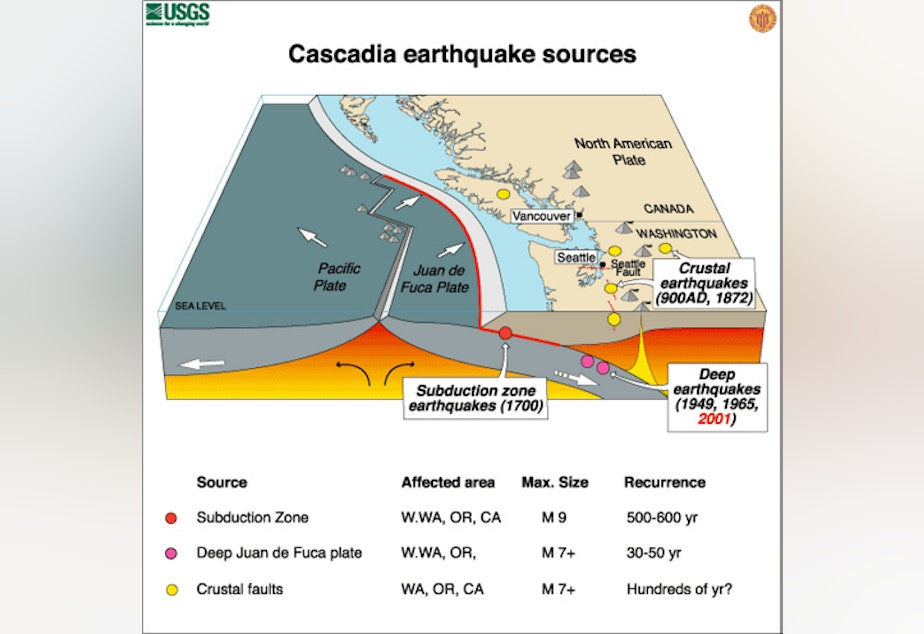The Earthquake That Probably Won't Devastate Seattle

Kathryn Schulz’s New Yorker article about Northwest earthquakes sent shockwaves through the Seattle area last week.
It described the damage a 9.0 magnitude quake offshore in the Cascadia subduction zone and resulting tsunami would do across a broad swath of the West Coast. The piece in the New Yorker itself was titled "The Really Big One," but a scarier headline appeared on social media: “The Earthquake That Will Devastate Seattle.”
Schulz told KUOW’s Marcie Sillman she didn’t know who wrote that headline.
“If it had been run past me I would have nixed it. It has a strange quality of being both too weak and too strong,” she said.
“It's too weak in that this earthquake risk is not at all just about Seattle. It's about a vastly larger region than that. And it's too strong in that it's not going to devastate Seattle. In fact, in a certain respect, Seattle is better off than a lot of other places in the region, which is not to say that it's not at risk. There will be real problems there and real casualties and real infrastructure damage, but no question it was a completely bizarre headline.”
Sponsored
On the risk of tsunami, she said the big urban areas are quite safe.
“They’re not going to get hit by a tsunami, they’re way too far inland or in the case of Seattle protected by the Sound,” she said.
But closer to the coast, she said there will likely be absolute devastation. “Essentially no structures and certainly no people who are within the inundation zone are going to get out OK,” she said.
“People in the city of Seattle do not need to worry about a tsunami from that kind of megaquake,” she said. “That said, if you like to go hang out at the coast, this is absolutely something you need to know about and absolutely something you need to find a way to protect yourself from.”
Given the amount that’s been written about the risk of megaquakes in the Northwest over the past 30 years, why did her story resonate so broadly?
Sponsored
“Although people within the region have been hearing about the risk from the Cascadia subduction zone for a very long time and from various sources, people outside the area for the most part genuinely didn't know,” she said.
“It was a real shock to discover that there is this major natural disaster lurking in a part of the country that people don't associate with natural disasters except possibly, you know, St. Helens or a rare one-off like that,” she said.
It helped, too, that The New Yorker has a reputation for being a thorough, sober, fact-checked source – and that its stories are in-depth.
Schulz, who used to live in Portland and edit Grist, an online environmental news outlet based in Seattle, said she’s not terrified of returning to the Northwest. In fact, she’s spending her summer out here.
But she won’t spend the night in the inundation zone on the Oregon coast.
Sponsored
“I think it's a very low odds that anything would hit while I was there, but if it did and ... you don't know the evacuation routes, would you want to wake up at 3 in the morning in the dark to some shaking and realize, 'oh man I don't know how to get out of here.'”
What would she advise people in the region, then?
“Go spend a weekend thinking about seismic safety and doing something about it,” she said. “Get yourself an earthquake kit. Get the necessary repairs done in your house. Talk to your family, and the truth is, if you've done that, you can worry very little.
You can go out and enjoy the Pacific Northwest.”

